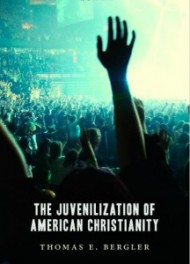The juvenilization of American Christianity…

Belief in God is declining. Belief among US adults is down from 82% to 74% when compared to previous years, according to a December 2013 Harris poll. Compared to 2005, belief in miracles is down from 79% to 72%, belief in heaven is down from 75% to 68%, belief that Jesus is God or the Son of God is down from 72% to 68%. These and other numbers indicate that, while many important religious beliefs are still held by a solid majority, there has been a significant decline in the past few years.
Such polls make the national headlines and get our attention. And they should, since they map trends reflecting the increasingly secular nature of our society. They should keep us alert to challenges facing the Church in our day. Most importantly, such polls should cause us ask about the health of the contemporary Church and its ability to respond to increasingly demanding challenges.
A historian who is immensely helpful in answering questions about the health of the Church is Thomas Bergler. His report is not too promising. While many parts of the Church exhibit a certain vibrancy, there is a lack depth, a lack of spiritual maturity. A quiet revolution over the past seventy-five years has resulted in the juvenilization of American Christianity.
Juvenilization is the process by which the religious beliefs, practices, and developmental characteristics of adolescents become accepted as appropriate for adults. It began with the praiseworthy goal of adapting the faith to appeal to the young, which in fact revitalized American Christianity. But it has sometimes ended with both youth and adults embracing immature versions of the faith. In any case, white evangelicals led the way.
Juvenilization happened when no one was looking. In the first stage, Christian youth leaders created youth-friendly versions of the faith in a desperate attempt to save the world. Some hoped to reform their churches by influencing the next generation. Others expected any questionable innovations to stay comfortably quarantined in youth rallies and church basements. Both groups were less concerned about long-term consequences than about immediate appeals to youth.
In the second stage, a new American adulthood emerged that looked a lot like the old adolescence. Fewer and fewer people outgrew the adolescent Christian spiritualities they had learned in youth groups; instead, churches began to cater to them. …
Today many Americans of all ages not only accept a Christianized version of adolescent narcissism, they often celebrate it as authentic spirituality. God, faith, and the church all exist to help me with my problems. Religious institutions are bad; only my personal relationship with Jesus matters. If we believe that a mature faith involves more than good feelings, vague beliefs, and living however we want, we must conclude that juvenilization has revitalized American Christianity at the cost of leaving many individuals mired in spiritual immaturity.
What to do? This question is addressed by Dr. Bergler in “Reversing the Juvenilization of American Christianity,” a talk at Southeastern Seminary in early 2013. Video of this talk is available here.
Sources & resources:
Thomas E. Bergler is professor of ministry and missions at Huntington University. His book, The Juvenilization of American Christianity, is available here.
A summary of Dr. Bergler’s work was published in Christianity Today, “When Are We Going to Grow Up? The Juvenilization of American Christianity.”


 January 16, 2014
January 16, 2014 







No comments yet... Be the first to leave a reply!